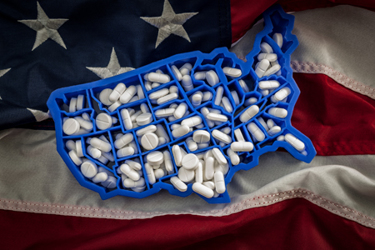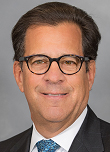Is The U.S. Ready For A Re-shored Pharma Supply Chain?
By Thomas V. Giannone, Avison Young

In the first part of this two-part series, we looked at how dependent the U.S. pharmaceutical supply chain is on critical ingredients produced in China and India and the risk that could pose to the nation’s drug supply. In this article, we will examine potential solutions to mitigate those risks and ensure the nation’s drug supply is secure.
For the United States to compete globally in the manufacturing of APIs, especially those contained in generics, we must find a way to leverage technology to reduce the labor cost differential. The FDA’s 2011 report, Pathway to Global Product Safety and Quality, noted that both China and India enjoy a labor cost advantage and that API manufacturing in India can reduce costs for U.S. and European companies by an estimated 30 percent to 40 percent. China has the following advantages:
- Most traditional drug production processes require large factory sites, which often have existing environmental liabilities.
- China has a low-cost labor force. If a typical western API company has an average wage index of 100, this index is as low as 8 for a Chinese company and 10 for an Indian company.
- China enjoys lower electricity, coal, and water costs.
- Chinese firms are also embedded in a network of raw materials and intermediary suppliers and, therefore, have lower shipping and transaction costs for raw materials.
- Chinese pharmaceutical manufacturers face fewer environmental regulations regarding buying, handling, and disposing of toxic chemicals, leading to lower direct costs for these firms.
According to FDA in testimony in October 2019, Safeguarding Pharmaceutical Supply Chains in a Global Economy, using traditional pharmaceutical manufacturing technology, a U.S.-based company could never offset the labor and other cost advantages that China enjoys simply by achieving higher productivity. However, the FDA believes that advanced manufacturing technologies could enable U.S.-based pharmaceutical manufacturing to regain its competitiveness with China and other foreign countries and potentially ensure a stable supply of drugs critical to the health of U.S. patients. Advanced manufacturing technology, which the FDA supports through its Emerging Technology Program (ETP), has a smaller facility footprint, lower environmental impact, and more efficient use of human resources than traditional technology.
The U.S. Government’s Response
Several legislative actions have been proposed to address the risks associated with the drug supply chain. Legislation by Senators Menendez and Blackburn was introduced in the Senate and is known as Securing America’s Medicine Cabinet (SAM-C). According to Senator Blackburn, “Congress and federal agencies can start now by reviewing regulations to ensure there are no barriers to rapid adoption of new technologies, creating incentives for workforce growth and training, and allowing the private sector to use updated, cost-effective technologies and processes that would enable U.S.-based companies to regain competitiveness in the API market.”
On March 19, Senator Tom Cotton and Congressman Mike Gallagher introduced the Protecting our Pharmaceutical Supply Chain From China Act, which proposes tracking active pharmaceutical ingredients through an FDA registry; prohibiting pharmaceutical purchases from China or products with active pharmaceutical ingredients created in China; creating transparency in the supply chain by instituting a country of origin label for all imported drugs; and providing economic incentives for manufacturing drugs and medical equipment in the United States.
Senator Marco Rubio is also planning to introduce legislation that will require drug makers to provide the FDA with the volume of APIs derived from each manufacturing source in the prior year. It would be included in the drug maker’s annual post-market report already required by the FDA. In addition, the legislation will restore Buy America Act preferences for pharmaceuticals and combat supply chain risk and U.S. dependence on China for APIs.
Senior Presidential Advisor Peter Navarro is also preparing an Executive Order that would reduce American dependency on foreign suppliers for medicine by moving production of essential medicines to the U.S.
A Final Perspective To Consider
There are many questions to be answered and gaps in the data to be researched before any meaningful and effective strategic plan can be developed and implemented. We know the supply chain is global, complex, and heavily reliant on overseas production from both reliable and sometimes not so reliable foreign countries. The risk is real, as confirmed by Senator Blackburn’s statement that, “Although we cannot yet quantify the U.S.’s dependence on pharmaceutical ingredients made in China, we do know that the more Chinese products flow into the U.S., the more potential there is for trouble.”
There is an urgent need for data to assess the risk before Congress will act on a potential future crisis, especially after a $2 trillion federal stimulus package to a very real current crisis: COVID-19.
The commercial imperative of near-shoring is a trend in many other sectors of the economy, as was recently highlighted in the Avison Young 2020 Forecast report. If the U.S. indeed decides that the most effective way to mitigate the risks to our drug supply chain in the long term is to “on-shore” the production of APIs (and possibly finished drugs, KSMs, and excipients), there must be a coordinated, consolidated, prioritized, and apolitical national commitment, with seamless partnerships between the private and public sectors, including universities and healthcare systems.
Pearl Harbor demonstrated that once engaged, the citizens of this country have the determination it takes to defeat any enemy, whether visible or invisible. I truly hope that when this COVID-19 pandemic passes, we will have the political willpower to better prepare the country and, hopefully, avoid the next crisis.
About The Author:
 Tom Giannone is a principal in Avison Young’s Occupier Solutions group in AY’s New Jersey office and is a founder of its Life Sciences Specialty Practice Group. For more than 25 years, Tom has specialized in developing real estate solutions for the life sciences industry. He holds a M.S. in engineering from Rutgers University and an MBA from New York University.
Tom Giannone is a principal in Avison Young’s Occupier Solutions group in AY’s New Jersey office and is a founder of its Life Sciences Specialty Practice Group. For more than 25 years, Tom has specialized in developing real estate solutions for the life sciences industry. He holds a M.S. in engineering from Rutgers University and an MBA from New York University.
